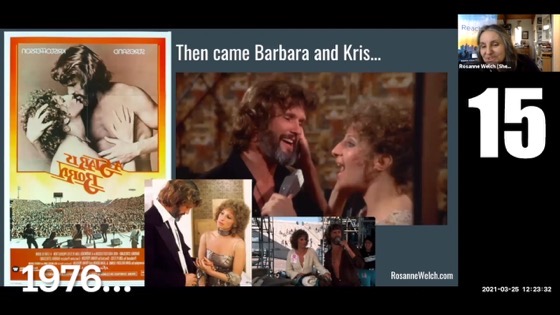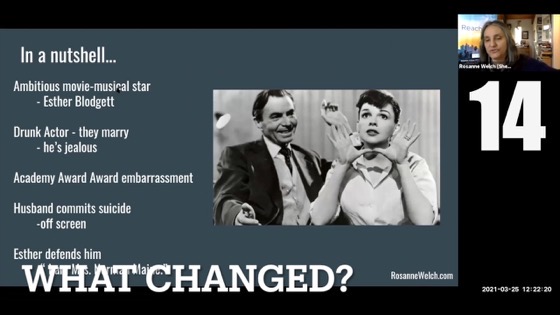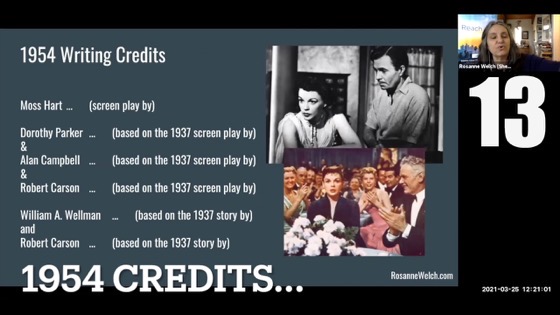Many thanks to Janice Law of the American Women Writers National Museum who invited me to give a short talk on The Women of Early TV.
I enjoyed sharing the names and careers of women like Peg Lynch, Gerturde Berg, Selma Diamond and D.C. Fontana to the members who gathered on Zoom last Wednesday morning. There are so many more I could have talked about whose names don’t appear in mainstream books about the history of television so we have to learn who they are and carry those names forward ourselves. It’s one of the missions of the Stephens College MFA in TV and Screenwriting – and has been one of my missions all my life.

Transcript:
My teaching philosophy is that Words matter, Writers matter,. and Women Writers matter and they are far too often left out of the history books that we use to teach our incoming students. My school is Stephens College as Jen has so nicely told you and we teach a program in TV and Screenwriting — a master’s program — and I’m excited to say that we are all about representation on television and we’re going to see a little example of that in my presentation today. So let’s get to it. One of the first women — we credit her with inventing the sitcom which is a money maker for television for all these many, many years. Peg Lynch. She began in radio, as many of these women did, and she was writing short sketches — 10 and 15 minute sketches — called the Ethel and Albert Comedies and this is the first time she took sort of domestic life and made jokes out of it and put that on the media right? In this case, radio shows and eventually they became television shows and to her credit, she has 11,000 scripts. So think about that as if she was writing for a variety show if you will. It went on for many years. There were many many episodes. So she’s the first person who really got into the husband and wife having a chat and let’s make some jokes about how tough real-life can be. Often with the wife being a little smarter than the husband right? Being a step ahead of him but society allowed him to move forward and of course, that’s a pattern we’re gonna see repeated naturally in I Love Lucy.
Many thanks to Janice Law of the American Women Writers National Museum who invited me to give a short talk on The Women of Early TV.
I enjoyed sharing the names and careers of women like Peg Lynch, Gerturde Berg, Selma Diamond and D.C. Fontana to the members who gathered on Zoom last Wednesday morning. There are so many more I could have talked about whose names don’t appear in mainstream books about the history of television so we have to learn who they are and carry those names forward ourselves. It’s one of the missions of the Stephens College MFA in TV and Screenwriting – and has been one of my missions all my life.
Watch this entire presentation
Women pioneers who created, produced or shepherded many of America’s most wildly popular, early television programs will be profiled by Dr. Rosanne Welch.
Podcast: Play in new window | Download
Subscribe: RSS
![02 Peg Lynch from “VISIBLE STARS: Women in Early TV” for the American Women Writers National Museum [Video]](https://rosannewelch.com/wp-content/uploads/2021/12/rmw-visible-stars-early-tv-02-1200x675.jpg)


![21 The Husband from Concord Days: Margaret Fuller in Italy [Video]](https://rosannewelch.com/wp-content/uploads/2021/12/rmw-concord-day-2021-fuller-rome-21.jpg)


![52 Conclusion from There And Back Again: Writing and Developing for American TV [Video]](https://rosannewelch.com/wp-content/uploads/2021/12/rmw-oxford-brookes-52.jpg)
![20 What Might Have Been? from Concord Days: Margaret Fuller in Italy [Video]](https://rosannewelch.com/wp-content/uploads/2021/12/rmw-concord-day-2021-fuller-rome-20.jpg)

![19 What Have We Learned? from Concord Days: Margaret Fuller in Italy [Video]](https://rosannewelch.com/wp-content/uploads/2021/11/rmw-concord-day-2021-fuller-rome-19.jpg)

![18 Tragedy from Concord Days: Margaret Fuller in Italy [Video]](https://rosannewelch.com/wp-content/uploads/2021/11/rmw-concord-day-2021-fuller-rome-18.jpg)